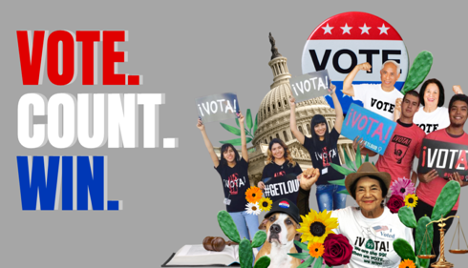Spotlight: Dolores Huerta Foundation Maps the Future
We are highlighting the third of three organizations supported by CVM, the Dolores Huerta Foundation, in this newsletter. If you missed our feature articles in the last two newsletters where we spoke to leaders of the other two groups (Valley Voices and Valley Forward), you can check them out on our CVM website.
For nearly 20 years, the Dolores Huerta Foundation (DHF), a 501(c)(3) organization, has been working to lift the lives of people in the Central Valley’s underserved communities. In this past year, the foundation has arguably had some of its biggest impact through its redistricting work and it plans to capitalize on that in 2022.
“We’re going to be working on a massive voter registration effort,” said Dolores Huerta, the 91-year-old labor leader icon and civil rights activist who cofounded DHF with her daughter, Camila Chavez. “We will all go forward together to make our democracy work.”
Huerta was once best known as cofounder (with Cesar Chavez) of the United Farmworkers Union. But in 2003 she started her namesake DHF, which has grown into a 40-staff organization based in Bakersfield. DHF’s mission is to inspire and organize communities to build local volunteer organizations empowered to pursue social justice. Its work spans the areas of civic engagement, equality, education, health and safety, and includes voting rights, voter education and registration.
DHF‘s work is a major reason why election maps for the valley’s congressional and state offices have been transformed. DHF coordinated a huge effort to persuade the redistricting commission — as well as local counties and cities and boards of education — to create fair maps. DHF also helped to create the Central Valley Equitable Maps Coalition, which included other local advocacy groups such as Valley Voices that represent underserved communities.
These efforts included:
Collecting 1,640 Community-of-Interest surveys to submit to the statewide redistricting commission
Preparing 3,783 individuals to participate in the redistricting process
Submitting nine county, city, state Assembly, state Senate, congressional and school district maps on behalf of the CV Equitable Maps Coalition.
It wasn’t easy. When DHF and its representatives showed up at public hearings held to consider re-drawing maps for local races, Pesante said, they encountered harassment from groups like the Proud Boys and partisan interference from conservative Republicans.
DHF also faced resistance from local leaders who would not allow the public to attend and speak at the public hearings by remote online connection. Many people were afraid to attend in person because they feared the risk of getting infected with COVID-19.
“They refused to let people participate remotely, and they refused to let people read email [aloud] at the hearing,” Pesante said.
Nevertheless, these newly fair districts at the congressional and state level have created a momentum that is already starting to spread down to the local election level, Pesante said.
“It’s like a clogged drain that is finally flushed. And all the way downballot, people are starting to go, ‘I’m going to run for this,’ and ‘they’re going to run for that.’ Literally, like the phones blow up on a daily to weekly basis,” Pesante said. “The excitement is being felt all the way downballot.”
While this develops, DHF is getting ready to make the most of the upcoming opportunity: midterm elections. They will be moving forward with a huge registration effort.
And they appreciate the recognition and support that has come from Central Valley Matters.
As Pesante said, “I’ve always been very impressed with Central Valley Matters that you ‘get it.’ Not many people do.”


